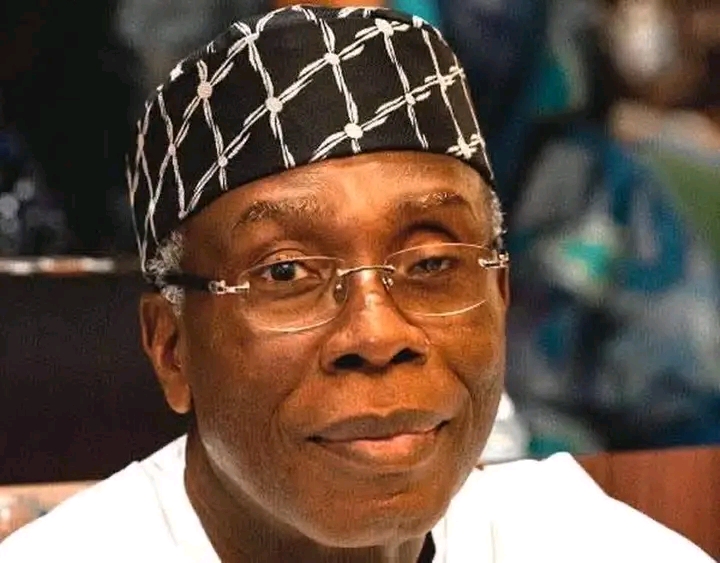
When a great tree falls, the forest does not merely lose shade—it loses an anchor. At the age of 78, Chief Audu Innocent Ogbeh, a farmer, educator, playwright, politician, and statesman, passed away on August 9, 2025, with the quiet dignity that characterized much of his life. His life was a symphony of intelligence, bravery, and leadership from Otukpo in the Idoma heartland to the national stage and beyond Nigeria’s boundaries. cultivated humility.
There are a lot of tributes on the internet these days, some of them personal, some political, and others poetic. There is a deeper tale to be told, though, underneath the clichés and the praise: a record to correct, myths to temper with reality, and lessons to be claimed—not just by Benue State or Idomaland, but by a world that needs leaders like him more and more.
Innocent Audu Ogbeh was born on 28 July 1947, in Otukpo, Benue State. He was a native of Idoma. Ogbeh attended the popular King’s College Lagos between 1967 and 1969 and then attended Ahmadu Bello University in Zaria, Kaduna State, Nigeria. He attended the University of Toulouse in France from 1973 to 1974. He lectured briefly at the Institute of Education, Ahmadu Bello University, Zaria, from 1972 to 1976, and was a lecturer and head of the Department of Humanities, Murtala College of Arts, Science and Technology, from 1977 to 1979.
Ogbeh was truly many things to different people; to some, he was a great scholar; to some, a farmer; and to some, he was one of the iconic political exploits from Benue Zone C District.
Few Nigerian politicians have walked comfortably across party lines without being swallowed by them. Ogbeh did—serving as
He was a federal minister, minister of communications, and, as minister of steel development during the government of Shehu Shagari, national chairman of the People’s Democratic Party between 2001 and 2005, during Olusegun Obasanjo’s government. Ogbeh left politics and went back to face his farm when the government of Muhammadu Buhari sought him to become the minister of agriculture between 2015 and 2019 and served with his charismatic leadership.
Before introducing himself as a former minister, Ogbeh frequently described himself as a farmer. He favored gender-inclusive policies, agricultural mechanization, and import substitution. He also recognized that identity’s symbolic value, which helped to keep him grounded and demonstrated that being a leader is an extension of, not a substitute for, honest labor.
And yet, the record must be kept honest. His agricultural tenure delivered vision and reform—but Nigeria’s food sector still faced stubborn realities: price volatility, rural poverty, and the slow crawl of mechanization. Ogbeh himself would admit that building food security is a generational, not ministerial, task.
In a political climate addicted to sound and fury, Ogbeh’s weapon was reasoned dissent. He could critique a sitting president without raising his voice and dismantle a flawed argument without dismantling the person making it. It is a trait Nigeria’s democracy sorely needs: the ability to fight for truth without making enemies of everyone in the room.
Accuracy is not pedantry here—it is the sincerest form of honor.
Lessons for Idomaland
From Otukpo’s red soil to Abuja’s marbled corridors, Ogbeh’s journey offers a blueprint:
Speak with courage, act with respect. The Idoma way is measured but firm.
Marry the hoe and the pen. Like Ogbeh, balance agriculture with education and art—land and language together yield enduring legacies.
Mentor widely. Create pathways for the young, not just positions for the loyal.
Lessons for Benue State
Make food security the state’s political and economic spine.
Model civil discourse in a plural political landscape.
Blend culture and commerce—turn Benue’s agricultural abundance into a creative economy anchor.
Lessons for Nigeria
Policy over personality—invest in programs that outlast political cycles.
Demand data-backed governance—debate facts, not just feelings.
Honor dignity in service—leaders who remain connected to their craft and community inspire trust.
Lessons for the World
Feed first, then flourish—economic miracles begin with full stomachs.
Courageous civility—debate fiercely, respect deeply.
Rural dignity—treat rural vocations as engines of innovation, not relics of the past.
The Ogbeh Charge
In his own way, Chief Audu Ogbeh taught us that politics, like farming, is the art of sowing seeds you may never see grow. The truest measure of a leader is not the offices they hold but the roots they leave in the soil of people’s lives.
If we in Idoma, Benue, Nigeria, and beyond forget these lessons, we lose more than a man—we lose the chance to plant what he once dreamed: a society where truth is spoken with grace, power is worn lightly, and the harvest is shared by all.
Source: A.O. Ochogwu, Esq.
Wikipedia
Facebook: Come To Benue


